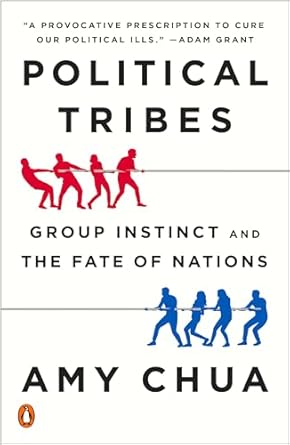

"To understand Trump’s relationship to the WWE and his appeal to its audience is to see a microcosm of the 2016 election. For Trump’s supporters, as in Wrestlemania, showmanship and symbols are often what matter. Where progressives saw an uncivilized brute bloviating about his sexual prowess, lying on cue, and viciously dressing down his opponents, Trump supporters saw something familiar and playfully spectacular. In Trump’s world, as in the wrestling world, absurd ‘alternative facts’ are not falsehoods but story lines, fueling an entertainment-driven narrative. Through this lens, Trump is a hero in the mold of Hulk Hogan or Stone Cold Austin: a domineering titan promising to vanquish the forces of evil, to crusade against political correctness, to make aggressive masculinity fashionable again. Riffing off political analyst Salena Zito’s famous statement that the press took Trump, ‘literally, but not seriously,’ whereas his supporters took him ‘seriously, but not literally,’ Trump donor - and, briefly White House communications director - Anthony Scaramucci put it this way: ‘don’t take him literally, take him symbolically.’"
Political Tribes by Amy Chua - 2019
"The prosperity gospel is one of the fastest-growing movements in the United States. It teaches that being rich is godly and that God will make people rich if they pray (and tithe) correctly. The number of poor and working class African and Hispanic Americans who belong to prosperity churches is growing exponentially. Three out of four Hispanic Christians in the United States believe that ‘God will grant financial success and good health to all believers who have enough faith.’ A Mexican American student of mine - whose family members are now in danger of being deported by the Trump administration - recently wrote to me: ‘In my opinion, the Prosperity Gospel explains how much of my Hispanic family can be anti-Obama and pro-Trump, despite that being so obviously against their self-interest. It’s a coping mechanism for poor people who feel hopeless in this world. Just a few weeks ago, my mom sent me a video of one of her favorite pastors snapchatting from Trump’s inaugural ball. My mom was so excited to see Trump welcoming in men she considers to be ‘holy.’ For me, this is frustrating to no end.'"
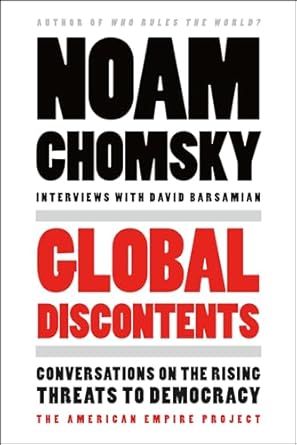

"So, for example, the Paris climate negotiations, COP 21, though not as strong as they should be, were at least a step in the right direction, perhaps the basis for further action in the future. But the summit did not establish a treaty with verifiable goals- only an informal agreement. The reason was very clear: a treaty couldn't get through the Republican Congress. So here you have a political organization that is essentially saying, 'Let's race to the precipice as fast as possible.' Donald Trump is being condemned for all sorts of things by liberal commentators, but not for the most important thing: his policies on the climate. He's calling for more fossil fuels, more coal plants, ending EPA regulations, possibly getting rid of the EPA altogether. He wants to dismantle the Paris agreements and stop giving support to developing countries for addressing climate change. That really is saying, 'Let's race to the precipice.' It's very serious. and the precipice is not far off. We're already close to- if not past- the limits that were proposed in the Paris discussions, a temperature increase of 1.5 centigrade."
Global Discontents by Noam Chomsky - 2017
"Just like Trump himself, contemporary evangelicalism has been profoundly shaped by celebrity and television. Trump’s path to evangelical strongman was not paved by a career in politics talking about faith, family, and freedom, the playbook followed by his predecessors and many of his onetime rivals, like Texas senator Ted Cruz, or now-Housing and Urban Development secretary Ben Carson. It was paved by a career starring in reality television and, importantly, studying Christian television and befriending some of its biggest stars. Trump is more like a televangelist than a politician - which is exactly why he was able to break the politician mold for evangelical voters who had come to believe that other presidential candidates, for all their faith talk, had ultimately failed to deliver government guided by ‘Christian’ or ‘biblical’ values. Previous Republican candidates cultivated relationships with televangelists in a quest for the votes of their considerable audiences. But more than any other Republican candidate, Trump’s politics were defined by televangelism itself. Although televangelists operate out of tax-exempt churches, at their core their ministries are businesses, bringing in millions of unaccountable cash, used for enriching the pastor with extravagances like mansions portrayed as parsonages, or private jets held to be essential tools for spreading the gospel. Televangelism has created an audience, for both church and politics, that is enthralled with showmanship and captivated by powerful personalities and flamboyant tales of miracles and supernatural successes, from cancer healed by prayer to bank accounts suddenly flush with heaven-sent cash."
80
81
"At one level, Trump's antics ensure that attention is focused on him, and it makes little difference how. Who even remembers the charge that millions of illegal immigrants voted for Clinton, depriving the pathetic little man of his Grand Victory? Or the accusations that Obama had wiretapped Trump Tower? The claims don't really matter. It's enough that attention is diverted from what is happening in the background. There, out of the spotlight, the most savage fringe of the Republican Party is carefully advancing policies designed to enrich their true constituency: the Constituency of private power and wealth, 'the masters of mankind,' to borrow Adam Smith's phrase. These policies will harm the irrelevant general population and devastate future generation, but that's of little concern to the Republicans. They've been trying to push through similarly destructive legislation for years. Paul Ryan, for example, has long been advertising his ideal of virtually eliminating the federal government, apart from service to the Constituency- though in the past he's wrapped up his proposals in spreadsheets so they would look wonkish to commentators. Now, while attention is focused on Trump's latest mad doings, the Ryan gang and the executive branch are ramming through legislation and orders that undermine workers' rights, cripple consumer protections, and severely harm rural communities. They seek to devastate health programs, revoking taxes that pay for them in order to further enrich their Constituency, and to eviscerate the Dodd-Frank Act, which imposed some much-needed constraints on the predatory financial system that grew during the neoliberal period. That's just a sample of how the wrecking ball is being wielded by the newly empowered Republican Party. Indeed, it is no longer a political party in the traditional sense. Conservative political analysts Thomas Mann and Norman Ornstein have described it more accurately as a 'radical insurgency,' one that has abandoned normal parliamentary politics."
Unholy by Sarah Posner - 2020
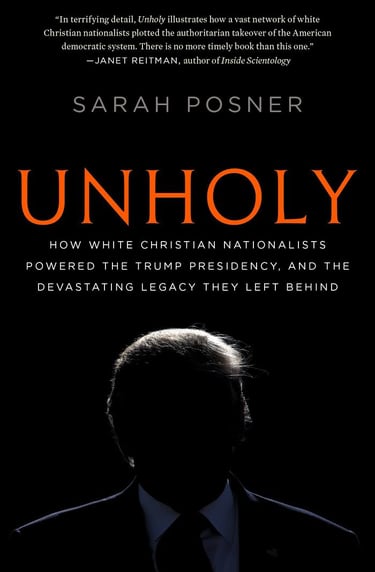

82
"(Frank) Amedia is part of an increasingly powerful network of televangelists, pastors, musicians, writers, and self-promoters who fuse elements of prosperity theology with the core belief of a more recent charismatic movement known as the New Apostolic Reformation (NAR). The NAR, which like the prosperity gospel is deeply controversial and even heretical to many conservative evangelicals, holds that modern-day prophets and apostles receive direct revelations from God. They are ‘anointed’ to mobilize their followers to engage in spiritual warfare against demonic enemies, all aimed at enabling Christians to ‘transform’ every one of America’s communities and take dominion over the seven ‘mountains’ or ‘spheres’ of societal influence - religion, family, education, government, media, arts and entertainment, and business. Like the prosperity gospel, the NAR has had a ripple effect throughout charismatic and Pentecostal Christianity in America and around the world, drawing in followers through television, podcasts, magazines, conferences, social media, and the overlapping, mutually reinforcing marketing efforts of its most prominent adherents. . . As a global movement who top ideologues often boast of its multicultural following, this burgeoning Christian movement seems to be an unlikely fit with Trump’s MAGA. But in many crucial ways, Trump and this fact-free, faith-based movement dovetail perfectly: their promotion of revelation over reality, spontaneous utterances over facts, baseless promises of wealth and success, and aggressive, accountability-free fund-raising."
"As much as the Christian right of the twenty-first century is now fixated on abortion and sexual politics, the backlash against the efforts of the federal government to desegregate tax-exempt private schools is embedded in the movement’s DNA. The white evangelical attraction to Trump was not in spite of his extended birther crusade against Barack Obama, his racist outbursts in tweets and rallies, and his administration’s plans to eviscerate federal protection of racial minorities from discrimination in housing and education by eliminating their ability to show discrimination based on the disparate impact of policy, as opposed to having to prove discriminatory intent. The Christian right movement was born out of grievance against civil rights gains for blacks, and a backlash against the government’s efforts to ensure those gains could endure. When Trump offers paeans to ‘religious freedoms’ - the very clarion call of the Bob Jones University defenders - or sloganeers ‘Make America Great Again,’ he is sending a message that rings true for a movement driven by the rhetoric and organizing pioneered by (Paul) Weyrich and (Robert) Billings. Trump’s white evangelical admirers do not just see a leader who is making it safe to say Merry Christmas again, or holding the IRS back from penalizing pastors who endorse him from the pulpit. In Trump’s words and deeds, they see an idealized white Christian America before civil rights for people of color - and a meddling government - ruined it."
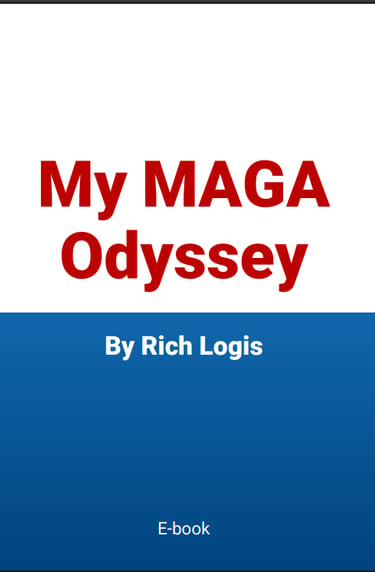

83
"But my search for information about January 6 led to a discovery: these were not irrelevant groups. That’s why Trump did not renounce them. They were his allies, and they had the blessing of the most powerful person in the world. That meant they had been my allies, as well.What had I done? How could I have missed what was undeniable? Like with Charlottesville, I dismissed the violence on January 6 as trivial, all because of my allegiance to MAGA. I knew Trump’s rhetoric had always been incendiary; it was a feature, not a bug, of the movement. Now I asked myself a very uncomfortable question: would I have downplayed the violence to the parents, children and loved ones of the US Capitol Police? I was complicit, having remained silent over Trump’s inflammatory, inciting language. The protestors and police who died during and after the attack on the Capitol would still be alive if not for Trump.I felt rage, confusion, shock, and, most acutely, shame. I deserved to be inextricably linked to the domestic terrorist groups I had once yawned at."
My Maga Odyssey by Rich Logis - 2024
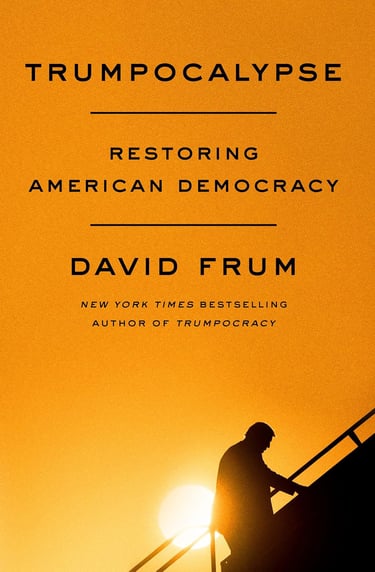

Trumpocalypse by David Frum - 2020
84
“Its supporters like to call it ‘nationalist’ – but it is anything but ‘nationalist.’ The new movement’s version of ‘nationalism’ attaches them not to the multiracial American nation with its capital in Washington, DC, but to a multinational white race with a capital in Moscow. The most fundamental concept in the politics of the new movement is the divide between friend and enemy, but for the new movement, the divide cuts through nations, not between them. Fellow citizens can be enemies; faraway co-racialists can be friends. This replacement of nation by race may explain why so many Trump supporters felt untroubled by Russian help for the Trump candidacy– or the flow of foreign money to Trump personally.”
“To defeat Trump and to prevent new Trumps, the United States (and other advanced societies, too) must control their borders and strengthen their nationality and their social-insurance systems to foster the sense of belonging that has ebbed away as our societies become more diverse, more interconnected, more plutocratic. I get the merits for the case of covering the ten million ors so illegal residents of the United States. The majority of those people have resided in the United States for more than a decade. What is to happen when those people get sick? Even more awkwardly: What is to happen when they grow old? Are we really to contemplate a future in which millions and millions of elderly US residents will be shrugged off in illness or frailty because they entered the country illegally back when Bill Clinton was president? Yet if we include those uninvited, unauthorized residents of the United States in the most valuable benefit offered by the national community, are we not also inviting tens of millions of more to break the law after them? It will be a hugely expensive project to cover even the population already illegally present. About half the illegal population of California, for example, earn incomes low enough to qualify for Medi-Cal, should it become available to them. If the American health-care system is to be stabilized, not only must costs be controlled, but eligibility must be defined and enforced. The path to citizenship that Democrats want for illegal residents must begin with demonstrated proof that large illegal immigration flows have been stopped forever. Canada is a country generally regarded as uniquely welcoming to immigration. Yet in July 2011, the second-highest Canadian federal court ruled that illegal aliens have no right to health-care coverage– and this decision remains the law to the time of writing. The Canadian policy of refusing health care to unauthorized immigrants is so uncontroversial within Canada that, as far as I can tell, nobody seems ever to have bothered to conduct a public poll about it. It just seems obvious to all concerned: you come to Canada legally, you get health care as part of the deal; if not, you don’t. If a society has an ethic– ‘This we will do for you whether you can afford it or not, just because you are one of us’ – then it must have a meaningful definition of ‘one of us.’”
“In one term, Trump managed to do immense damage to the world, to the United States, and to his own party – damage that will take a long time to repair, but damage that is not beyond repair. Should there be a second term, however, some things will be wrecked forever – and among those things will be the Republican Party as an institution. The Republican Party enabled Trump’s corruption and authoritarianism through four years. It backed him against the most emphatically justified impeachment in US history. Soon it will renominate Trump for president. Its strategy for reelecting him depends on visibly preventing minorities from voting and welcoming foreign interference in US elections. Its most plausible scenario for success is to win the Electoral College against the popular vote for the third time in twenty years. What will be the character of such a political party after such a history? Not a democratic political party that’s for sure. It will have degenerated into a caudillo’s personal entourage, a cult of personality that exists to enable and protect the maximum leader. They will not be conservatives; they will be Peronists. And their degradation will degrade the political system in a way that cannot be repaired. No two-party system can remain a democracy unless both parties adhere to democratic values, not just one. Even the best-intentioned, most public-spirited people had to make deals with the devil to accomplish anything in the Trump years. At first, the compromises might seem modest: some flattery, maybe, or a little lying to cover up some bizarre presidential behavior. Sooner or later, though, the Trump official would find himself or herself in the kind of situation so memorably described by National Security Advisor John Bolton: ‘I am not part of whatever drug deal Sondland and Mulvaney are cooking up’ (referring to EU ambassador Gordon Sondland and chief of staff Mick Mulvaney). But only the very deft or the very lucky will emerge from the Trump administration with altogether clean hands. Outside the government, many people volunteered to champion Trump’s case in the media. They had less power than the insiders. They will bear even more of the blame because of their greater conspicuousness. Some of them had large personal reputations before they signed up – more or less reluctantly – to the pro-Trump cause. Some of them are – or were – friends of mine. Why did they do it? Some followed Trump because they saw opportunities for advancement, or because they had families to feed, or because they worried what their friends would think if they did not. Some went along because they did not respect their profession, their audience, or themselves. It was only TV after all, and as presidential adviser Kellyanne Conway self-revealingly remarked in January 2017, ‘People realize that no one on TV is under oath.’ The most committed of them volunteered for Trump because – whatever Trump’s other faults – he offered them revenge on political or cultural enemies.”
“Trump’s core supporters were never fooled by him. The DC lobbyists and Beltway operators who profited from the Trump years, the third-tier political hacks who were appointed to top-tier jobs, the Fox News and social media grifters who scammed a living out of cultural resentment, the donors whose taxes dropped by millions: they all accurately perceived Trump’s defect as a man and a leader. Trump’s defects actually made life easier for them. A more intelligent president would have been harder to manipulate. A more upright president might have calmed the social tensions so lucrative to enflame.”
“If (a conservative young man’s) elders and leaders succeed now, he will inherit a political system from which the idea of ‘law’ means only ‘jargon we use to get our way and weapons we use to harass our opponents.’ He will inherit a constitutional system in which that constitution has forfeited its legitimacy because it was abused to impose the wishes of a privileged few upon the permanently disadvantaged many.”
“Those laws and treaties guarantee every asylum claimant an individual hearing–which is why a nation’s asylum system comes crashing down when asylum seekers start showing up by the hundreds of thousands and then the millions, as they have done in Europe and the United States since the middle 2010s. The new mass wave of asylum seekers yearn to escape poverty, lawlessness, the loss of farms to environmental degradation. But they are seldom fleeing individual persecution of the kind to which the asylum system was intended to answer. The large and growing problems of Central America and West Africa call for humane international solution, but the migration of millions of their people to other countries is not that solution – and if we are not realistic about that truth now, we will stock reactionary movements compared to which the Trump episode will seem a pale dawn glimmer of a red and terrible day. . . The right to live in the United States is a huge prize.”
85
“A few years later, a Democratic congressional committee chairman visited the office of the magazine where I was an intern. When a staffer asked what Democrats would do about Iraq, the congressman responded that they would let Bush ‘own it,” the way they’d let him own his plan to privatize Social Security, which sank his poll numbers–as if Iraq were just an abstract policy proposal, not a real place where people were dying every day for no reason. Every high-level politician involved in that disaster got away with it. There were no consequences. And then, in 2016, the Republican presidential primary debates created an opportunity for something truly extraordinary, what in the romance novel is called ‘emotional justice.’ Jeb Bush was the establishment candidate, and there was no better stand-in for George Bush than Jeb. In a debate, Trump said, with deliberate emphasis, ‘Obviously, the war in Iraq was a big, fat, mistake.’ Watching it live, my heart fluttered. ‘George Bush made a mistake,’ Trump continued. ‘We can make mistakes–but that one was a beauty. We should never have been in Iraq. We have destabilized the Middle East.’ He was telling this aristocrat, Look at this fucked up world we have to live in because of your incompetent dynasty. Trump shouted, ‘You call it whatever you want. I will tell you: they lied. They said there were weapons of mass destruction and there were none. And they knew there were none. There were no weapons of mass destruction.’ It was incredible. He said it to Jeb’s face, in front of the entire Republican Party, on Fox News. As support for Trump continued to swell against all expectations, there was a persistent question: Why did his supporters like him so much? How could they possibly think this crass billionaire with a dumb reality show cared about them at all? When I went out into the country to interview Trump supporters, I would think back to the way Trump lit Jeb on the Iraq War, and how in that moment, I felt like he spoke for me. Trump expressed the anger that a lot of Americans felt about the previous thirty years of public policy.”
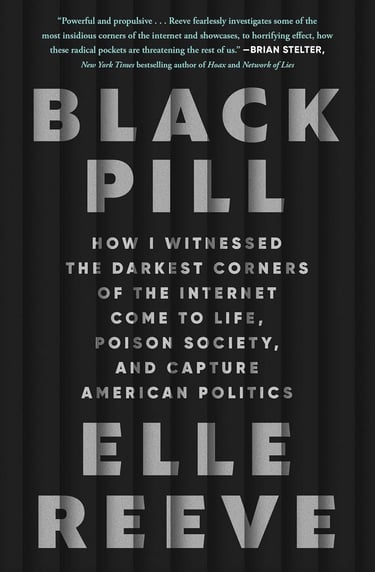

Black Pill by Elle Reeve - 2024
“Trump liked the glamour of the military. He liked the way it represented force, and the way it commanded respect. He didn’t understand where that respect came from–that the military serves a shared set of principles, not a single man. In office, he tried to subvert this idea. In June 2020, Trump threatened to deploy active-duty troops to put down the protests after the murder of George Floyd. In response, Mark Milley, chairman of the Joint Chiefs of Staff, released a message to military commanders saying every member of the military swears an oath to the Constitution, which grants Americans the right to freedom of speech and peaceful assembly. At Milley’s retirement ceremony three years later, he said, ‘We don’t take an oath to a king or a queen or to a tyrant or a dictator. . . We take an oath to the idea that is America, and we’re willing to die to protect it.’ That same month, Trump posted online that Milley deserved to be executed.”
86
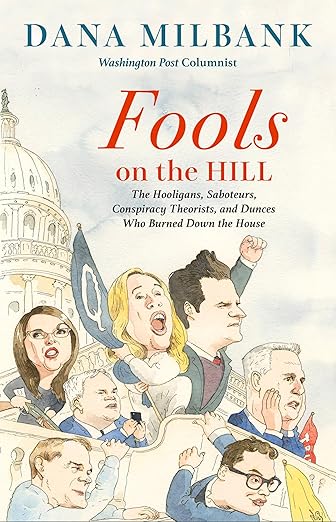

Fools on the Hill by Dana Milbank - 2024
“Another Trump innovation was the discovery that, because of intense tribal partisanship in the GOP, there was no longer such a thing as shame or disgrace. Trump, caught in wrongdoing or scandal, blamed the ‘Deep State’ or the ‘globalists’ – and the party rallied to his defense. The politics of victimhood was the essence of Trump (who could, and did, claim it was sunny when it was raining). Trump loved to complain about the ‘witch-hunts’ and the ‘hoaxes’ and how unfairly he was treated by the ‘fake news’ – and many Republicans believed him. Naturally, the technique filtered down to the rank and file. Where once there was shame, there was now only grievance, directed at imaginary conspiracies of dark forces. When Luna and Ogles were caught fabricating their past, they played the victim, claiming persecution by leftists. Santos, too, used this playbook. His lies are everybody else’s fault – honest!”
“Were Republicans to succeed in their demands to defund the FBI, Wray told the Judiciary Committee, they would leave Americans more vulnerable to fentanyl cartels, violent criminals, gangs, sex predators, foreign and domestic terrorists, cyberattacks, and Chinese spies. But House Republicans were answering to a higher authority. The order had come out from Mar-a-Lago in early April. ‘DEFUND THE DOJ AND THE FBI,’ Trump demanded on Truth Social after his indictment. Like good little boys and girls, House Republicans joined the defund-the-FBI movement. ‘We must defund and dismantle the FBI,’ proclaimed Biggs. ‘We have to defang and defund them,’ said Gaetz. ‘It’s past time to cut their budget,’ added Bishop. ‘The only way to rein them in is to cut their budget,’ agreed Comer. House Republicans even rewrote a ceremonial resolution in praising law enforcement to avoid anything that might be seen as support for the FBI. As Punchbowl News noted, the National Police Week resolution originally offered ‘sincere gratitude and appreciation to the Nation’s law enforcement officers.’ The House GOP changed that to say ‘local law enforcement officers deserve our respect and profound gratitude.’ Democrats on the Judiciary Committee repeatedly tried to add language saying the federal law enforcement deserved the same respect and gratitude – but Republicans on the panel blocked them, saying it wasn’t ‘germane.’ In the House of Republicans’ quest, only one consideration was germane: trashing the federal government and all who worked in it.”
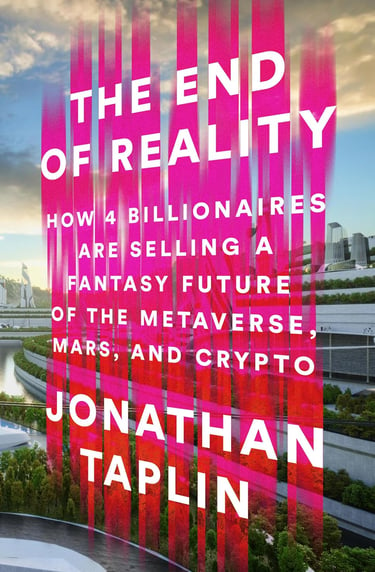

87
The End of Reality by Jonathan Taplin - 2023
“Thiel and Andreessen would ensure that the libertarian point of view was sacrosanct when Facebook faced one of its biggest political challenges in December 2015. A Facebook content moderator flagged a video that Republican presidential candidate Donald Trump had posted to the site. It was a speech Trump had just given in South Carolina, during which he excoriated President Obama for treating ‘illegal immigrants better than wounded warriors.’ Trump went on to say, ‘Donald J. Trump is calling for a total and complete shutdown of Muslims entering the United States until our country’s representatives can figure out what the hell is going on.’ The content moderator asked his boss whether this violated Facebook’s hate speech rules. By the time the question got to Facebook chief operating officer Sheryl Sandberg’s desk, the post had generated one hundred thousand likes and been shared fourteen thousand times. Sandberg convened a video call with her team, including Joel Kaplan, a Republican operative whom she had hired as a Washington lobbyist conservatives would trust. Kaplan was conferenced in from India, where he was working to save Zuckerberg’s Free Basics scheme. Sandberg indicated that several senior executives were worried about Trump’s speech, but Kaplan was adamant that conservatives would see the removal of Trump’s speech as censorship. ‘Don’t poke the bear,’ he advised. When Zuckerberg talked to Thiel, Thiel reinforced Kaplan’s point of view. The security team pointed out that Trump had been flagged on numerous occasions by users for violating the hate speech rules, and multiple strikes were grounds for removing the account completely. But Kaplan, a Harvard Law School grad who had clerked for Supreme Court justice Antonin Scalia, came up with a rationalization for how Facebook could let Trump live by different rules than the average user. He argued that Trump could be protected under a ‘newsworthiness standard’ - in other words, that Trump deserved extra protection because the public could make up their own minds based on the unedited posts. Kaplan and Zuckerberg did not poke the Trump bear, but it was left to the young CEO of Facebook to defend the policy decision in front of an angry group of employees at one of Facebook’s regular town hall meetings. When a young Muslim employee asked why Trump’s speech targeting Muslim was not hate speech, Zuckerberg fell back on the talking point Peter Thiel had given him. The issue was hard, he said, but he believed in the First Amendment; free expression was at the core of Facebook’s mission. Over the course of Trump’s presidency, Kaplan’s role as head of global policy at Facebook became even more critical. And he and Peter Thiel suggested that the newsworthiness standard should not be applied just to presidents. In November 2020, Zuckerberg told an all-staff meeting that Steve Bannon had not violated enough policies to be suspended from Facebook - this after the ex-Trump adviser suggested in a video that FBI director Christopher Wray and Dr. Anthony Fauci be beheaded.”
“Curtis Yarvin, one of Peter Thiel’s favorite bloggers, wrote that some people are ‘more suited to slavery’ than others. Yarvin leads the Neoreactionary movement, whose adherents believe that American democracy is a failed experiment and should be replaced by a monarchy, with the ruler similar to the CEO of a corporation. Though Thiel might not be willing to go that far publicly, Yarvin believed that he had convinced Thiel that libertarianism was a doomed project without the inclusion of authoritarianism. He argued, ‘We should get over our dictator-phobia.’ After Thiel said that Republican members of Congress who voted for Trump’s impeachment after the January 6 attacks were ‘traitorous,’ Yarvin noted of Thiel, ‘He’s fully enlightened, but just plays it very carefully.’ Looking forward to the 2024 election, Yarvin believes the Republican candidate (Trump or a Trump clone) should campaign on a specific mandate: ‘If I’m elected, I’m gonna assume absolute power in Washington and rebuild the government.’ Once that’s done, Yarvin believes elite institutions like Harvard and the New York Times need to be closed down. And then we nationalize all local police and National Guard troops. Yarvin’s law-and-order prescriptions are simple:
A trivial database query can identify the set of humans in the country who are either a) productively employed, b) independently wealthy, or c) a well-supervised dependent of a) or b). Everyone else, including all minors, gets the tag. This inconspicuous device fits on your ankle and continuously reports your position to the authorities. If no crimes are committed near your location, you have nothing to worry about.
Saddled with a large number of residents who are effectively dependents of the state - for example, those who receive housing subsidies. These people need to be reprocessed to determine whether they can become members of productive society, and during this time there is no reason to leave them where they are. Therefore, we can expect to establish secure relocation centers, in which the 20th century’s artificially decivilized subpopulations will receive social services in a controlled environment while they are reintroduced to civilized society.”
“But it is in politics that Trump has used Fantasy (‘Obama is not an American’; ‘I won the 2020 election’) to fuel his political rise since 2011. Today the hard-right amplification of the fantasy that a ‘woke’ socialist and communist cabal has taken over the Democratic Party, the news media, education, and even many large American corporations poisons our possibility for political reconciliation. This is straight out of the Nazi Party playbook of the early 1930s that inflated the power of the German socialists. Adolf Hitler blamed the burning of the German parliament, the Reichstag, on the communists and then immediately banned them from political participation. In 1977 German writer Klaus Theweleit, in his book Male Fantasies, set out to understand the appeal fascism had for the average German male who joined the Nazi Freikorps (equivalent to our Proud Boys) in the 1930s. Guardian writer Laura Smith reviewing Male Fantasies, notes, ‘To modern readers, the Freikorpmen’s fantasy life will be familiar: a country in decline, a nationalistic call to purge it of disorder, a clear separation between men and women, rich and poor, your kind and the other.’
So for the Technocrats, this is not just an economic project. It is a political movement that sees the modern economy as corrupt, harmful, and in need of sweeping transformation. In the spirit of their anarcho-libertarian heroes, like Ayn Rand, the four Technocrats believe that the ‘administrative state’ needs to be killed off. If they achieve their aims, by 2035 they will be living in a semi-stateless economic system where no one even knows how much Bitcoin they own, because it can be legally held under a pseudonym or in a shadow company account. As Peter Thiel has stated, ‘The ability to move money fluidly and the erosion of the nation-state are closely related.’
In this project, Trump and other Republicans are the Technocrat’s supplicants. Just as Vladimir Putin has pleased his oligarch allies by using oil export revenues to prop up the ruble and the Russian stock market, instead of providing the tools needed for a credible military, so our own oligarchs will be able to depend on the Republicans to cut their taxes and protect their monopolies. Trump already has associates (some working with Peter Thiel) creating a plan for his second term that would involve firing much of the federal bureaucracy and replacing it with MAGA-compliant functionaries at all of the regulatory agencies. Are the Technocrats divorced from reality, or is this a darker plot that is employing fantasy to enact a right-wing political coup that will kill our majoritarian democracy and lead us into an era of economic unrest and civil war? For the Technocrats, Web3 puts their wealth, data, and resources beyond the reach of the state. It helps them sidestep ant-money-laundering regulations, sanctions, and taxation. And as you will see, Thiel and some of his brethren have had a kind of apocalyptic view of the future for some time. Maybe that’s why they all own ‘bolt-hold’ estates in distant lands like New Zealand.”
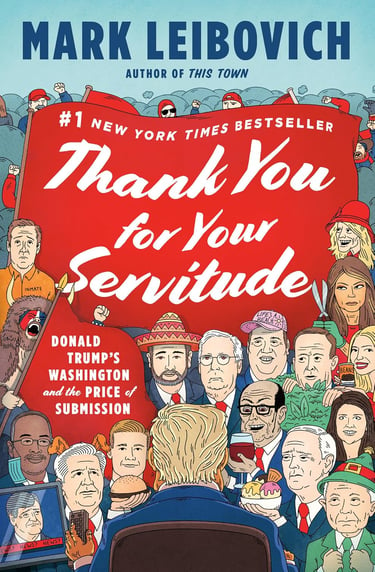

88
Thank you for Your Servitude by Mark Leibovich - 2022
“But it was also clear that what remained of the Republican party was bonded as tightly as ever to Trump. Newly ‘former Republicans’ were replaced by this new breed of ‘Trump Republicans,’ whose energized ranks included previous nonvoters, onetime fringe actors (now mainstreamed), conspiracy pushers, white identity fetishists, and the like. Trump kept transgressing, in ways that were more and more egregious, yet their devotion endured. Trump was their party. Not a fusty old entity that espoused some bullshit about ‘family values’ or ‘compassionate conservatism.’ Trump’s spool of personal grievances had become their own. In effect, his narcissism did, too. How could the viewpoints or experiences of others ever be valid? How could anyone not vote for Trump?”
“‘Lindsey (Graham) was really good at this game,’ one senior White House official said. He did not mean golf. Rather, the game of playing Trump. Graham was a scratch performer. He could be stunningly open about how easy a mark Trump was. Flattery was always important with Trump, Graham said, but there was an art to it. ‘If you flatter him all the time, he’ll lose respect for you,’ he told me. If Graham wanted Trump to do something, especially on foreign policy, he would just tell him Obama would do the opposite. ‘That could be very effective,’ Graham said.”
“The longer Trump survived without ramifications, the easier it became for him. No scandal could ever be processed before the next one came along. Outrage fatigue was his best enabler.”